时态专项讲解
初中英语动词时态专项讲解与练习题
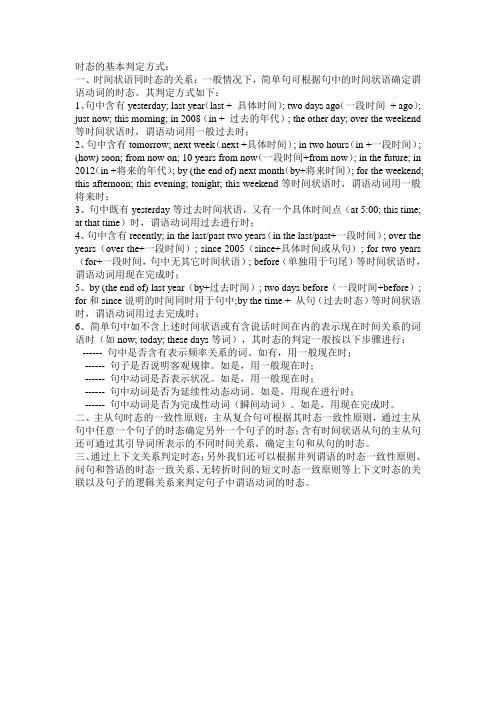
时态的基本判定方式:一、时间状语同时态的关系:一般情况下,简单句可根据句中的时间状语确定谓语动词的时态。
其判定方式如下:1、句中含有yesterday; last year(last + 具体时间); two days ago(一段时间+ ago); just now; this morning; in 2008(in + 过去的年代); the other day; over the weekend 等时间状语时,谓语动词用一般过去时;2、句中含有tomorrow; next week(next +具体时间); in two hours(in +一段时间); (how) soon; from now on; 10 years from now(一段时间+from now); in the future; in 2012(in +将来的年代); by (the end of) next month(by+将来时间); for the weekend; this afternoon; this evening; tonight; this weekend等时间状语时,谓语动词用一般将来时;3、句中既有yesterday等过去时间状语,又有一个具体时间点(at 5:00; this time; at that time)时,谓语动词用过去进行时;4、句中含有recently; in the last/past two years(in the last/past+一段时间); over the years(over the+一段时间); since 2005(since+具体时间或从句); for two years (for+一段时间,句中无其它时间状语); before(单独用于句尾)等时间状语时,谓语动词用现在完成时;5、by (the end of) last year(by+过去时间); two days before(一段时间+before); for和since说明的时间同时用于句中;by the time + 从句(过去时态)等时间状语时,谓语动词用过去完成时;6、简单句中如不含上述时间状语或有含说话时间在内的表示现在时间关系的词语时(如now; today; these days等词),其时态的判定一般按以下步骤进行:------ 句中是否含有表示频率关系的词。
中考常考五大时态专题讲解

中考常考五大时态专题讲解一.一般过去时1. 谓语构成:was/were/动词的过去式动词的过去式不规则变化:did, went, came, knew, ran, took, bought, got etc.2. 标志词:yesterday, the day before yesterday, last week, two days ago, 变just now, the other day, in 1990 etc.3. 用法:过去某个时间发生的动作或状态My father worked in Shanghai last year4. 一般疑问句:有be则提前be,有实义动词则开头用助动词Did,动词现原形5. 变否定句:有be则be后直接加not,有实义动词则在主语后加didn’t,谓语动词现原形。
Eg:1)She was in America last month.Was she in America last month?She w asn’t in America last month.2) They grew a rose just now.Did they grow a rose just now?They didn’t grow a rose just now.动词过去式的规则变化:二.一般现在时1. 谓语构成:am/is/are/动词原形或第三人称单数2. 标志词:always, usually, often, sometimes, at times, hardly ever, every day, once a week3. 用法:1)表示现在经常性或习惯性的动作I get up at 6 o’clock every morning.2) 表示客观真理、事实、格言The earth moves around the sun.3)表示主语具备的能力、特征、状态She has bright and beautiful eyes.4)表示按规定要发生的动作The train leaves at nine in the morning.5)在时间和条件状语从句中,用一般现在时表将来If it ra ins, I won’t go swimming.4. 变一般疑问句:有be则提前be,有实义动词则开头用助动词Do/Does,动词现原形5. 变否定句:有be则be后直接加not,有实义动词则在主语后加don’t/doesn’t,谓语动词现原形。
时态讲解
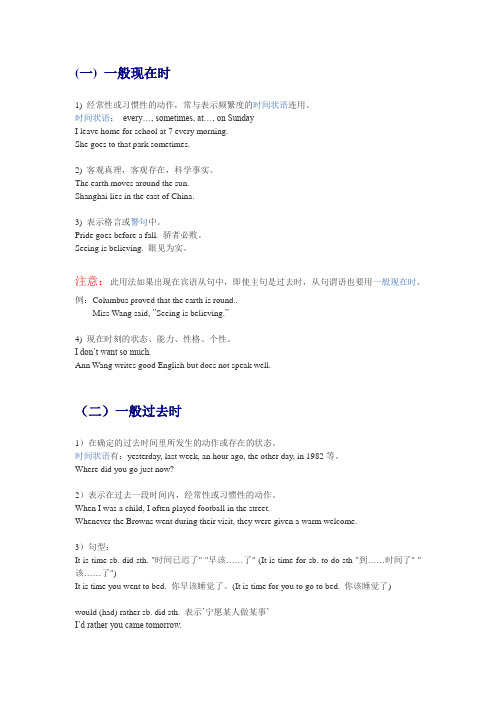
(一) 一般现在时1) 经常性或习惯性的动作,常与表示频繁度的时间状语连用。
时间状语:every…, sometimes, at…, on SundayI leave home for school at 7 every morning.She goes to that park sometimes.2) 客观真理,客观存在,科学事实。
The earth moves around the sun.Shanghai lies in the east of China.3) 表示格言或警句中。
Pride goes before a fall. 骄者必败。
Seeing is believing. 眼见为实。
注意:此用法如果出现在宾语从句中,即使主句是过去时,从句谓语也要用一般现在时。
例:Columbus proved that the earth is round..Miss Wang said, ”Seeing is believing.”4) 现在时刻的状态、能力、性格、个性。
I don’t want so much.Ann Wang writes good English but does not speak well.(二)一般过去时1)在确定的过去时间里所发生的动作或存在的状态。
时间状语有:yesterday, last week, an hour ago, the other day, in 1982等。
Where did you go just now?2)表示在过去一段时间内,经常性或习惯性的动作。
When I was a child, I often played football in the street.Whenever the Browns went during their visit, they were given a warm welcome.3)句型:It is time sb. did sth. "时间已迟了" "早该……了" (It is time for sb. to do sth "到……时间了" "该……了")It is time you went to bed. 你早该睡觉了。
(详细)初中九大时态讲解

(详细)初中九大时态讲解1. 一般现在时 (Simple Present Tense)描述经常发生的动作、真理、现状和喜好等。
* 用法:主语 + 动词原形 (+ 其他)2. 现在进行时 (Present Continuous Tense)描述正在进行的动作或现在的状况。
* 用法:主语 + be 动词的现在分词 (+ 其他)3. 一般过去时 (Simple Past Tense)描述在过去发生的完成的动作或情况。
* 用法:主语 + 动词过去式 (+ 其他)4. 过去进行时 (Past Continuous Tense)描述在过去某个时间正在进行的动作。
* 用法:主语 + be 动词的过去分词 (+ 其他)5. 一般将来时 (Simple Future Tense)描述将来要发生的动作或情况。
* 用法:主语 + will/shall + 动词原形 (+ 其他)6. 将来进行时 (Future Continuous Tense)描述在某个将来时间正在进行的动作。
* 用法:主语 + will/shall + be + 动词的现在分词 (+ 其他) 7. 现在完成时 (Present Perfect Tense)描述发生在过去但对现在有影响的动作或情况。
* 用法:主语 + have/has + 动词过去分词 (+ 其他)8. 过去完成时 (Past Perfect Tense)描述在过去某个时间或发生的动作或情况。
* 用法:主语 + had + 动词过去分词 (+ 其他)9. 将来完成时 (Future Perfect Tense)描述在某个将来时间之前将要完成的动作或情况。
* 用法:主语 + will/shall + have + 动词过去分词 (+ 其他)在研究和掌握这九大时态时,可以通过大量的练和实践来加深理解和记忆。
希望本文档对您有所帮助!参考资料:。
六年级英语四大时态专项讲解
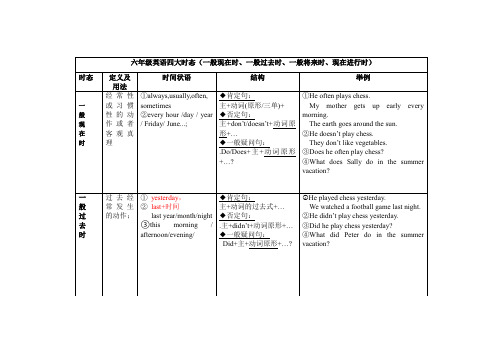
主+动词的过去式+…
◆否定句:
.主+didn’t+动词原形+…
◆一般疑问句:
Did+主+动词原形+…?
Heplayed chessyesterday.
We watched a football game last night.
②He didn’t play chessyesterday.
③Didhe play chessyesterday?
④What did Peter do in the summer vacation?
一
般
将
来
时
将要发生的动作;
1tomorrow+
Tomorrow morning/afternoon
2next+时间
nextweek/year/Friday
1.will
◆肯定句:
主+will+动词原形+…
◆否定句:
主+will + not+动词原形+…
◆否定句:
主+don’t/doesn’t+动词原形+…
◆一般疑问句:
.Do/Does+主+动词原形+…?
①Heoftenplays chess.
My mother gets up early every morning.
The earth goes around the sun.
②He doesn’t play chess.
◆一般疑问句:
Will +主+动词原形+…?
2.be going to
英语八大时态详细讲解
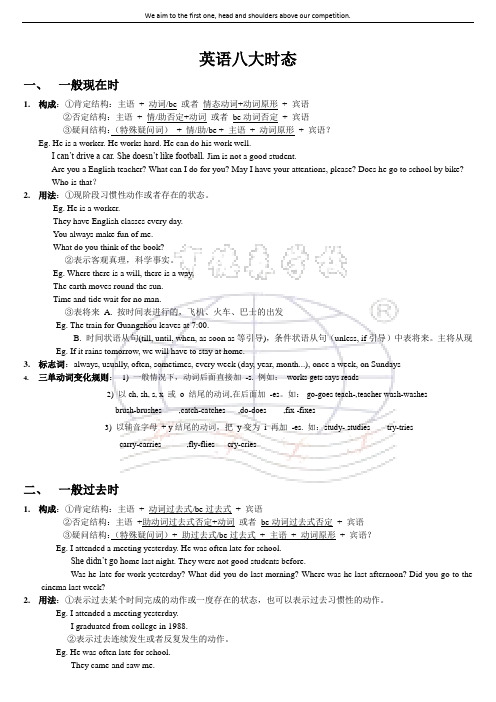
5.不规则变化
六、过去进行时
1.构成:①肯定结构:主语+was/were + doing+ (宾语)
②否定结构:主语+was/were not + doing+ (宾语)
④不能用于进行时的动词:A.表示感觉的(feel, smell, sound, taste)
Eg. The plan sounds good.
B.表示感情、拥有关系、状态或思想的动词:agree, believe, belong, contain, hate, hear, like, love, mind, possess, seem, understand, want等
Eg. I wasgoingto leave when it began to rain.
He looked as if he was about to burst into tears.
③was/were to do和was/were doing:
Eg. I was seeing off my sister at the station the next day.
4)重读闭音节,双写词尾辅音字母加ed.如: preferred(重读在fer前); admittedstopped
三、一般将来时
1.结构:①肯定结构:主语+be going to + do或者will/shall + do+宾语
②否定结构:主语+be not going to + do或者will/shall not + do+宾语
He is not going to play basketball this weekend.
(完整)高中九大时态讲解
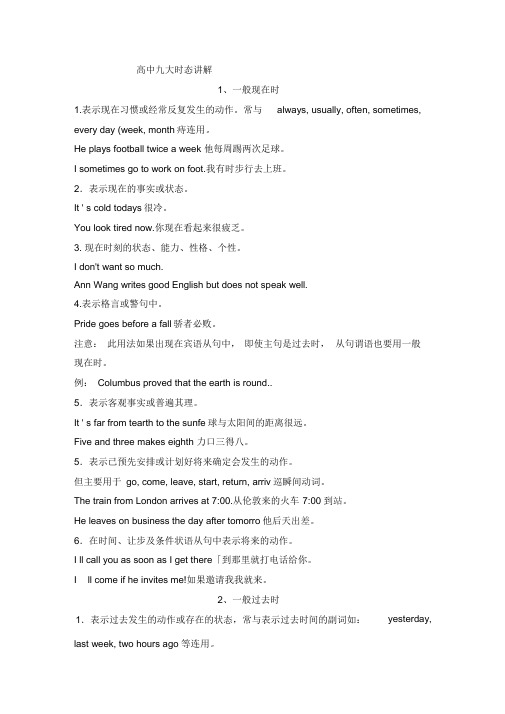
高中九大时态讲解1、一般现在时1.表示现在习惯或经常反复发生的动作。
常与always, usually, often, sometimes, every day (week, month痔连用。
He plays football twice a week 他每周踢两次足球。
I sometimes go to work on foot.我有时步行去上班。
2.表示现在的事实或状态。
It ' s cold todays很冷。
You look tired now.你现在看起来很疲乏。
3. 现在时刻的状态、能力、性格、个性。
I don't want so much.Ann Wang writes good English but does not speak well.4.表示格言或警句中。
Pride goes before a fall骄者必败。
注意:此用法如果出现在宾语从句中,即使主句是过去时,从句谓语也要用一般现在时。
例:Columbus proved that the earth is round..5.表示客观事实或普遍其理。
It ' s far from tearth to the sunfe球与太阳间的距离很远。
Five and three makes eighth 力口三得八。
5.表示已预先安排或计划好将来确定会发生的动作。
但主要用于go, come, leave, start, return, arriv巡瞬间动词。
The train from London arrives at 7:00.从伦敦来的火车7:00 到站。
He leaves on business the day after tomorro他后天出差。
6.在时间、让步及条件状语从句中表示将来的动作。
I ll call you as soon as I get there「到那里就打电话给你。
I ll come if he invites me!如果邀请我我就来。
英语中的16种时态汇总讲解(附例句)

英语中的16种时态汇总讲解(附例句)1. 一般现在时(do/does; is/am/are)①现在的动作、情况、状态和特征。
例:She is a teacher.她是一位老师②经常性、习惯性动作。
例:He always helps others.他总是帮助别人。
③客观事实和普遍真理。
如果前后文不是一般现在时,则无法保持主句、从句时态一致。
例:The earth moves round the sun.地球绕着太阳转。
④表示一个按规定、计划或安排要发生的动作。
例:The next train leaves at 3 o'clock this afternoon.下一趟火车今天下午3点开车。
⑤在时间和条件状语从句里经常用一般现在(有时也用现在完成时)表示将来事情。
例:When you have finished the report, I will have waited for about 3 hours.等你完成这份报告的时候,我就已经等了将近3个小时了。
①表示此时此刻正在发生的事情。
例:He is listning to the music now.他现在正在听音乐。
②表示目前一段时间内一直在做的事情,但不一定此时此刻正在做。
例:I am studying computer this term.这个学期我一直在学习计算机。
③现在进行时可以表示将来的含义。
瞬时动词的进行一定表将来。
例:I am leaving.我要离开了。
持续动词的进行只有有将来的时间状语或有将来语境中才表将来。
例:I am travelling next month.下个月我要去旅行。
④现在进行时与频度副词连用,表示说话者或褒义或贬义的感情色彩。
例:He is always helping others.他总是帮助别人。
(褒义)①表示动作到现在为止已经完成或刚刚完成,强调对现在产生的影响。
例:I bought a new house, but I haven't sold my old one yet, so at the moment I have two houses.我买了一所新房子,但是还没有卖掉旧的,所以现在我又两所房子。
初中英语八大时态讲解及练习(全)
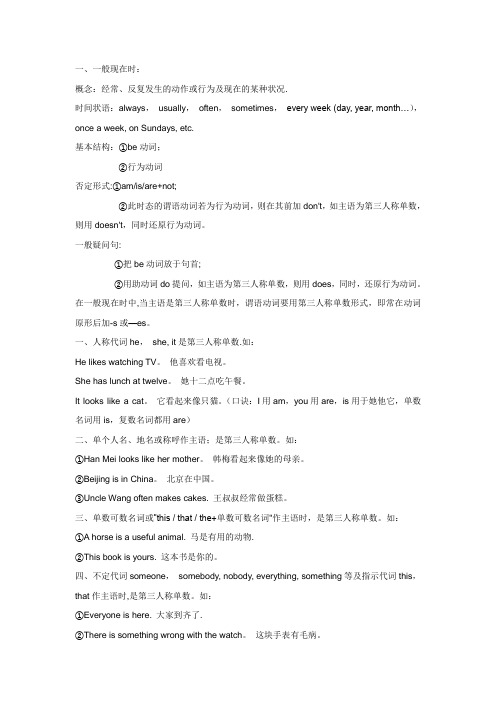
一、一般现在时:概念:经常、反复发生的动作或行为及现在的某种状况.时间状语:always,usually,often,sometimes,every week (day, year, month…),once a week, on Sundays, etc.基本结构:①be动词;②行为动词否定形式:①am/is/are+not;②此时态的谓语动词若为行为动词,则在其前加don't,如主语为第三人称单数,则用doesn't,同时还原行为动词。
一般疑问句:①把be动词放于句首;②用助动词do提问,如主语为第三人称单数,则用does,同时,还原行为动词。
在一般现在时中,当主语是第三人称单数时,谓语动词要用第三人称单数形式,即常在动词原形后加-s或—es。
一、人称代词he,she, it是第三人称单数.如:He likes watching TV。
他喜欢看电视。
She has lunch at twelve。
她十二点吃午餐。
It looks like a cat。
它看起来像只猫。
(口诀:I用am,you用are,is用于她他它,单数名词用is,复数名词都用are)二、单个人名、地名或称呼作主语;是第三人称单数。
如:①Han Mei looks like her mother。
韩梅看起来像她的母亲。
②Beijing is in China。
北京在中国。
③Uncle Wang often makes cakes. 王叔叔经常做蛋糕。
三、单数可数名词或”this / that / the+单数可数名词"作主语时,是第三人称单数。
如:①A horse is a useful animal. 马是有用的动物.②This book is yours. 这本书是你的。
四、不定代词someone,somebody, nobody, everything, something等及指示代词this,that作主语时,是第三人称单数。
中考备考 时态专项 -(一般现在 一般将来 一般过去) 讲解及中考练兵

学校:________ 班级:_________ 姓名:__________语法专项动词的时态初中阶段需掌握的六种基本时态有:一般现在时、一般过去时、一般将来时、现在进行时、过去进行时和现在完成时。
本节重点是一般现在时、一般过去时和一般将来时。
一、一般现在时(一)结构1.主语+be动词(am/is/are)+其他;2.主语+实义动词原形/第三人称单数形式+其他;(二)标志词常见的时间标志词包含often,sometimes,usually,always,on Sundays,every day/week/month/year 等。
(三)用法1.表示经常性或习惯性的动作或状态。
如:I drink milk every day. 我每天都喝牛奶。
2.表示普遍真理、客观存在或科学事实。
如:The moon moves around the earth.月球绕着地球转。
3.“主将从现”原则。
主句是一般将来时,从句是由when,after,before,not...until,as soon as 等引导的时间状语从句或由if,unless,as long as,once引导的条件状语从句时,谓语动词应用一般现在时。
如:I will tell you as soon as I know the result.我一知道结果就告诉你。
二、一般过去时(一)结构1.主语+be动词(was/were)+其他;2.主语+实义动词过去式+其他;(二)标志词常见的时间标志词包含yesterday,just now,two days ago,last night/week/month/year,the other day 等。
(三)用法1.表示过去某个时间发生的动作或存在的状态。
如:Last year I went to the Hangzhou National Tea Museum. 去年我去了杭州国家茶叶博物馆。
2.表示在过去一段时间内,经常性或习惯性的动作。
初中英语八种时态讲解

work→worked
结尾是e的动词在末尾加-d
like→liked live→lived hope→hoped
末尾只有一个辅音字母的重读闭音 plan→planned 节,先双写这个辅音字母,再加-ed stop→stopped
drop→dropped
结尾是“辅音字母+y”的动词,先 study→studied
语法专题(一)
时态
一般现在时 一般过去时 现在进行时 过去进行时 现在完成时 过去完成时 一般将来时 过去将来时
一般现在时
一、一般现在时:
概念:经常、反复发生的动作或行为及现 在的某种状况。 时间状语: always, usually, often, sometimes, every week (day, year, month…), once a week, on Sundays, etc. 基本结构:①be动词;②行为动词 否定形式:①am/is/are+not;②此时态的谓 语动词若为行为动词,则在其前加don't,如 主语为第三人称单数,则用doesn't,同时 还原行为动词。 一般疑问句:①把be动词放于句首;②用 助动词do提问,如主语为第三人称单数, 则用does,同时,还原行为动词。
什么情况下用?
①表示经常或习惯性的动作或存 在的状态。②表示主语通常的能 力、兴趣爱好、和性格特征。③ 表示客观的事实或真理。④表示 按照时刻表或已经计划安排好的 将来行为。(只限于是go, come, leave, arrive, begin, start, take off, stop, be等表示开始或移动意义的 词。)⑤在时间状语从句和条件 状语从句中,主句用一般将来时 (will+动词原形),从句中用一般
英语 动词时态 9种 16种 形式 用法 讲解 知识点总结 完整版 最全 归纳 专项
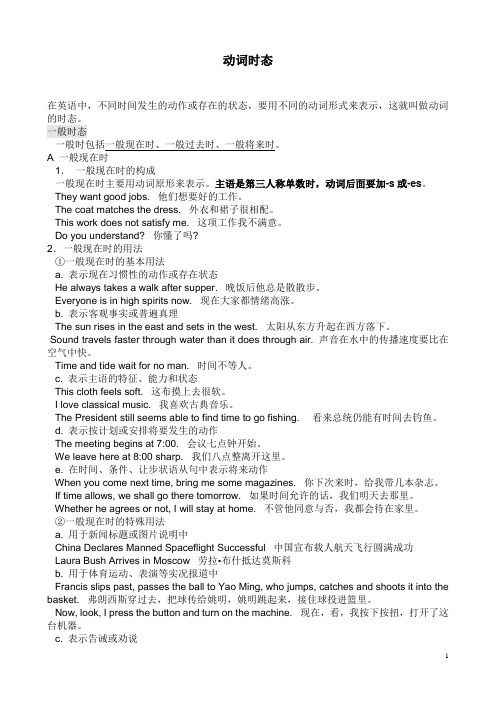
动词时态在英语中,不同时间发生的动作或存在的状态,要用不同的动词形式来表示,这就叫做动词的时态。
一般时态一般时包括一般现在时、一般过去时、一般将来时。
A 一般现在时1.一般现在时的构成一般现在时主要用动词原形来表示。
主语是第三人称单数时,动词后面要加-s或-es。
They want good jobs. 他们想要好的工作。
The coat matches the dress. 外衣和裙子很相配。
This work does not satisfy me. 这项工作我不满意。
Do you understand? 你懂了吗?2.一般现在时的用法①一般现在时的基本用法a. 表示现在习惯性的动作或存在状态He always takes a walk after supper. 晚饭后他总是散散步。
Everyone is in high spirits now. 现在大家都情绪高涨。
b. 表示客观事实或普遍真理The sun rises in the east and sets in the west. 太阳从东方升起在西方落下。
Sound travels faster through water than it does through air. 声音在水中的传播速度要比在空气中快。
Time and tide wait for no man. 时间不等人。
c. 表示主语的特征、能力和状态This cloth feels soft. 这布摸上去很软。
I love classical music. 我喜欢古典音乐。
The President still seems able to find time to go fishing. 看来总统仍能有时间去钓鱼。
d. 表示按计划或安排将要发生的动作The meeting begins at 7:00. 会议七点钟开始。
We leave here at 8:00 sharp. 我们八点整离开这里。
16种英语时态讲解
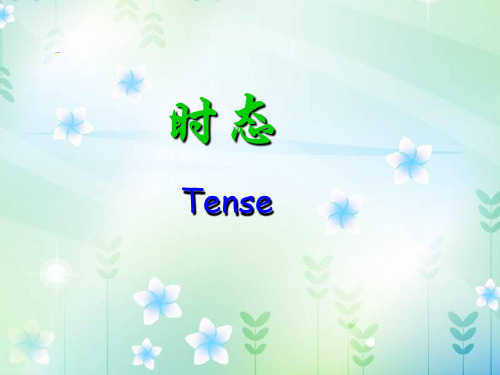
2) 心理状态的动词:know, realize, think see, believe, suppose,
imagine, agree, recognize, remember, want, need, forget, prefer,
mean, understand, love, hate…
• I need your help.
12
知识扩展:不用进行时的动词
1) 事实状态的动词:have, belong, possess, cost, owe, exist, include,
contain, matter, weigh, measure, continue…
• I have two brothers. This house belongs to my sister.
现在进行时的基本用法
用法3: 表示最近的将来一定的安排. 通常含有“计划”, “安排做”之意.
• I am taking a makeup test tomorrow. • — what are you doing on Saturday night?
— I’m doing some shopping with Jane. 用法4: 常与always, forever, continually, constantly 等连用,表示抱怨,厌烦, 不合情理或使人不愉快的事.
用法1: 表示说话此刻动作正在进行.
• He is not available now. he is talking on the phone.
• Please don’t make so much noise. I am studying. 用法2: 表示现阶段正在持续的动作,说话时刻动作 不一定正在发生.
初中英语八大时态的详细讲解与练习
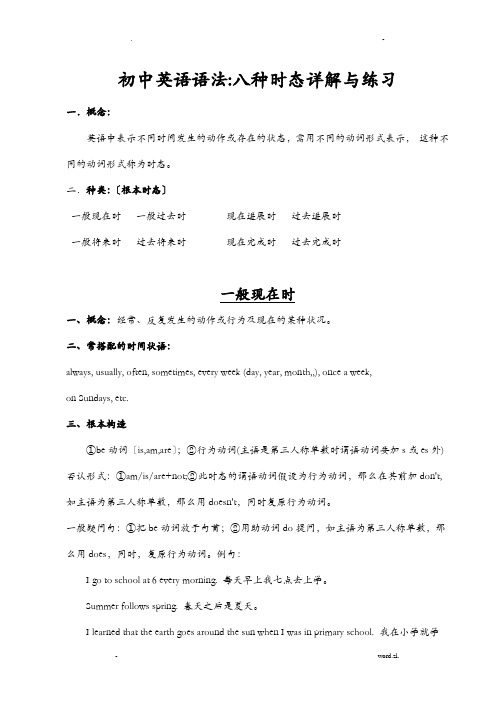
初中英语语法:八种时态详解与练习一.概念:英语中表示不同时间发生的动作或存在的状态,需用不同的动词形式表示,这种不同的动词形式称为时态。
二.种类:〔根本时态〕一般现在时一般过去时现在进展时过去进展时一般将来时过去将来时现在完成时过去完成时一般现在时一、概念:经常、反复发生的动作或行为及现在的某种状况。
二、常搭配的时间状语:always, usually, often, sometimes, every week (day, year, month…), once a week,on Sundays, etc.三、根本构造①be动词〔is,am,are〕;②行为动词(主语是第三人称单数时谓语动词要加s或es外) 否认形式:①am/is/are+not;②此时态的谓语动词假设为行为动词,那么在其前加don't,如主语为第三人称单数,那么用doesn't,同时复原行为动词。
一般疑问句:①把be动词放于句首;②用助动词do提问,如主语为第三人称单数,那么用does,同时,复原行为动词。
例句:I go to school at 6 every morning. 每天早上我七点去上学。
Summer follows spring. 春天之后是夏天。
I learned that the earth goes around the sun when I was in primary school. 我在小学就学过地球是围绕太阳转的。
Pride goes before a fall. 骄者必败。
四、根本用法:1) 描述当前时间经常出现、反复发生的动作或存在的状态。
在这种情景中,句子常带有表示频率的时间状语:always , everyday , often , once a week (month , year , etc.) , sometimes , seldom , usually等等,以表示句中的动作或状态是习惯性的、经常性的。
小学四种时态讲解及专项练习
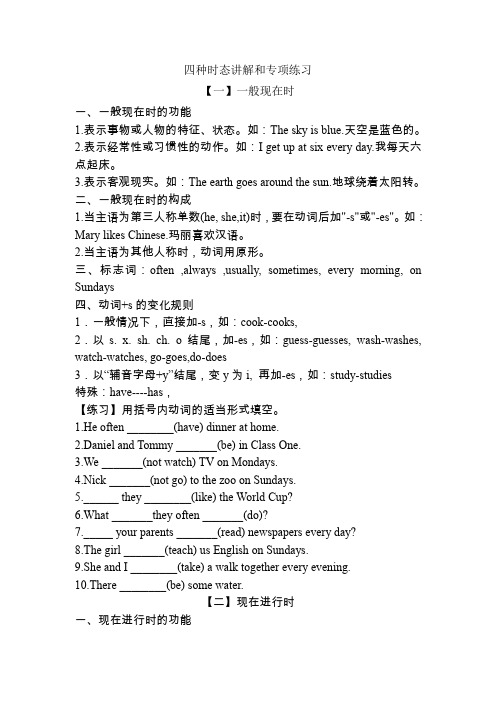
四种时态讲解和专项练习【一】一般现在时一、一般现在时的功能1.表示事物或人物的特征、状态。
如:The sky is blue.天空是蓝色的。
2.表示经常性或习惯性的动作。
如:I get up at six every day.我每天六点起床。
3.表示客观现实。
如:The earth goes around the sun.地球绕着太阳转。
二、一般现在时的构成1.当主语为第三人称单数(he, she,it)时,要在动词后加"-s"或"-es"。
如:Mary likes Chinese.玛丽喜欢汉语。
2.当主语为其他人称时,动词用原形。
三、标志词:often ,always ,usually, sometimes, every morning, on Sundays四、动词+s的变化规则1.一般情况下,直接加-s,如:cook-cooks,2.以s. x. sh. ch. o结尾,加-es,如:guess-guesses, wash-washes, watch-watches, go-goes,do-does3.以“辅音字母+y”结尾,变y为i, 再加-es,如:study-studies特殊:have----has,【练习】用括号内动词的适当形式填空。
1.He often ________(have) dinner at home.2.Daniel and Tommy _______(be) in Class One.3.We _______(not watch) TV on Mondays.4.Nick _______(not go) to the zoo on Sundays.5.______ they ________(like) the World Cup?6.What _______they often _______(do)?7._____ your parents _______(read) newspapers every day?8.The girl _______(teach) us English on Sundays.9.She and I ________(take) a walk together every evening.10.There ________(be) some water.【二】现在进行时一、现在进行时的功能现在进行时表示现在正在进行或发生的动作,也可表示当前一段时间内的活动或现阶段正在进行的动作。
高中英语语法专题二: 英语时态语态专项讲解与练习 (含答案)
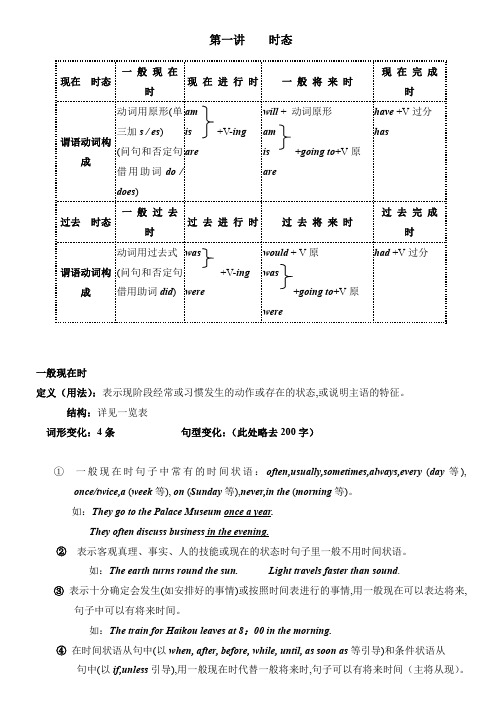
第一讲时态一般现在时定义(用法):表示现阶段经常或习惯发生的动作或存在的状态,或说明主语的特征。
结构:详见一览表词形变化:4条句型变化:(此处略去200字)①一般现在时句子中常有的时间状语:often,usually,sometimes,always,every(day等),once/twice,a(week等),on(Sunday等),never,in the(morning等)。
如:They go to the Palace Museum once a year.They often discuss business in the evening.②表示客观真理、事实、人的技能或现在的状态时句子里一般不用时间状语。
如:The earth turns round the sun.Light travels faster than sound.③表示十分确定会发生(如安排好的事情)或按照时间表进行的事情,用一般现在可以表达将来,句子中可以有将来时间。
如:The train for Haikou leaves at8:00in the morning.④在时间状语从句中(以when,after,before,while,until,as soon as等引导)和条件状语从句中(以if,unless引导),用一般现在时代替一般将来时,句子可以有将来时间(主将从现)。
如:Please ring me up as soon as you arrive in Germany.If it rains tomorrow,we will have to stay at home.一般过去时定义(用法)表示过去某时发生的动作或状态,这种动作或状态可能是一次性,也可能经常发生。
结构:详见一览表词形变化:(4条规则与不规则)句型变化:(此处略去200字)①表示过去具体时刻发生的一次性动作时,时间状语有:at(eight)(yesterdaymorning),(ten minutes)ago,when引导的时间状语从句。
- 1、下载文档前请自行甄别文档内容的完整性,平台不提供额外的编辑、内容补充、找答案等附加服务。
- 2、"仅部分预览"的文档,不可在线预览部分如存在完整性等问题,可反馈申请退款(可完整预览的文档不适用该条件!)。
- 3、如文档侵犯您的权益,请联系客服反馈,我们会尽快为您处理(人工客服工作时间:9:00-18:30)。
2013.11.10(周日)上课内容及练习时态专项一、课前引导练习①Her father _______ (read) a newspaper last night.②She lived there before he____to China.A. cameB. comesC. comeD. Coming③.Look, the children______ basketball on the playground. ( play )④.It is very cold .I think it______ . ( rain )⑤.He said that he______back in five minutes . ( come )⑥. When______you______the car ? In 1998 . ( buy )⑦.Light ___________(travel )much faster than sound.⑧“Where ________we________(meet)?”“Let’s meet outside the park gate.”1.一般过去式①在确定的过去时间里所发生的动作或存在的状态。
时间状语有:yesterday,last week,an hour ago,the other day,in 1982等。
例:Where did you go just now?②表示在过去一段时间内,经常性或习惯性的动作。
例:When I was a child,I often played football in the street.特殊句型(需重点掌握)(1)It is time for sb.to do sth.“到……时间了”、“该……了”(2).It is time sb.did sth.“时间已迟了”、“早该……了”例:It is time for you to go to bed.你该睡觉了。
It is time you went to bed.早该睡觉了。
③would (had)rather sb.did sth.表示“宁愿某人做某事”例:I’d rather you came tomorrow.Attention:一般过去时的时间状语应该是表示过去某个时间的词或词组,如:yesterday,last month,in 1999,two days ago等,绝对不可与recently,in the past 10 years,this month等连用,因为这样的时间状语都与现在有关系,应该用现在完成时或一般现在时。
2.一般现在时①经常性或习惯性的动作,常与表示频率的时间状语连用。
时间状语:every…,sometimes,at…,on Sunday例:I leave home for school at 7 every morning.②客观真理、客观存在、科学事实。
例:The earth moves around the sun.Shanghai lies in the east of China.③.表示格言或警句中。
例:Pride goes before a fall. 骄者必败。
注意:此用法如果出现在宾语从句中,即使主句是过去时,从句谓语也要用一般现在时。
例:Columbus proved that the earth is round.④.现在时刻的状态、能力、性格、个性。
例:I don’t want so much.Ann Wang writes good English but does not speak well.3.现在进行时①.表示说话时正在进行的动作。
常和now,Look!Listen!或其他铺垫句及情景设置句连用。
Eg1.I am reading a book now.Eg2.Look!They are having a basketball match.Eg3.Listen!He is playing the piano.Eg4.It’s 7:00 pm.The Greens are watching TV.②.表示现阶段正在进行着的动作但说话时不一定正在进行。
Eg1.He is working in a shoe factory these days.(临时性的工作)Eg2.Mr.Green is writing another novel. (说话时并未在写,只处于写作的状态。
)③.表示在近期按计划或安排要进行的动作。
即用现在进行体表示将来要发生的动作。
但一般要与将来时间连用,而且仅限于少量动词。
例如:come,go,start,arrive,leave,stay等。
Eg1.Mr.Smith is leaving for London tomorrow.Eg2 Are you staying here till next week?④.常与表示渐变的动词连用。
例如:get,grow,become,turn,,begin 等。
Eg1.The leaves are turning red.Eg2.It’s getting warmer and warmer.4.一般将来时一般将来时表示将来某个时间要发生的动作,事情或存在的状态,也表示将来经常或反复发生的动作或事情。
①will/shall+动词原形shall用于第一人称,常被will 所代替。
will 在陈述句中用于各人称,在征求意见时常用于第二人称。
will not=won't shall not=shan't 例如:Which paragraph shall I read first?我先读哪一段呢?Will you be at home at seven this evening? 今晚七点回家好吗?② be going to +不定式,表示将来。
a. 主语的意图,即将做某事。
例如:What are you going to do tomorrow? 明天打算作什么呢?b. 计划,安排要发生的事。
例如:The play is going to be produced next month。
这出戏下月开播。
c. 有迹象要发生的事。
例如:Look at the dark clouds, there is going to bea storm. 看那乌云,快要下雨了。
③ be +不定式表将来,按计划或正式安排将发生的事。
例如:We are to discuss the report next Saturday.我们下星期六讨论这份报告。
④ be about to +不定式,意为马上做某事。
例如:He is about to leave for Beijing. 他马上要去北京。
注意:be about to do 不能与tomorrow, next week 等表示明确将来时的时间状语连用。
Notice:be to和be going tobe to 表示客观安排或受人指示而做某事,be going to 表示主观的打算或计划。
例如:I am to play football tomorrow afternoon. 明天下午我去踢球。
(客观安排)I'm going to play football tomorrow afternoon. 明天下午我想去踢球。
(主观安排)⑤现在进行时表将来时下列动词的现在进行时表示将来时e.fly.leave.start.begin.finish.end.arrive and so on.she is leaving for Wuhan tomorrow.⑥一般现在时表将来1)下列动词come, go, arrive, leave, start, begin, return的一般现在时可以表示将来,主要用来表示在时间上已确定或安排好的事情。
例如:The train leaves at six tomorrow morning. 火车明天上午六点开。
When does the bus star? It stars in ten minutes. 汽车什么时候开?十分钟后。
2)以here, there等开始的倒装句,表示动作正在进行。
例here comes the car!二、课堂升级练习一、用所给词的适当形式填空:1.He______swimming in the river every day in summer. (go)2.It________you are right. ( seem )3.Look, the children______ basketball on the playground. ( play )4.It is very cold .I think it______ . ( rain )5. I need some paper .I______ some for you . ( bring )6.He said that he______back in five minutes . ( come )7.I______my bike, so I have to walk to school. ( lose )8.He______down and began to read his newspaper. ( sit )9.I______with you if I have time . ( go )10.We will go to the cinema if it______fine . (be )11.I will tell her the news when she______to see me next week. (come)12. When______you______the car ? In 1998 . ( buy )13.What______you______ at five yesterday afternoon ? (do)14.The bike is nice . How much______it______? (cost)15.The plan _____________(give) up because of rain.16.If it __________(not rain) tomorrow, we ____________(go )fishing.17.Mike says he _________(want )to be a worker after he _________ (finish )school. 18.She _________(not go) to bed until she _______(finish) her work.19.Light ___________(travel )much faster than sound.20.I __________(feel) much better after I _______(take) the medicine.21.”Where ________we________(meet)?”“Let’s meet outside the park gate.”22.I_________(be) afraid Mr Johnson __________(not visit) out school tomorrow. 23.________this kind of car __________(produce) in Shanghai?24.The shop ___________(close) at this time of day.25.________the doctor __________(send) for last night?26.Some children ___________(take ) good care by the nurse. 27.Some new houses _________(build) by the villagers themselves. 28.What language ________(speak) in Australia?29.The colour TV _________(buy) in that shop three days ago. 30.The doctor said Jim must ________(operate ) on at once.二、选择最佳答案填空()1.Well go swimming if the weather______fine tomorrow.A. isB.wasC. will beD.is going to be()2.Please dont leave the office until your friend______back.A.cameesC.have comeD.will come ()3.By the end of last year he______about 1500 English words.A. learnsB.learnedC.was learningD.had learned ()4.Listen ! Someone______in the next room .A.criedB.cryingC.is cryingD.has cried()5.You must tell him the news as soon as you______him.A.seeB.seesC.will seeD.is seeing()6.He told me that he______to see us the next day.esB. cameC. will comeD. would come()7.The teacher told us that the sun______bigger than the earth.A. isB. wasC. has beenD.will be()8.Could you tell me where the railway station______?A. wasB. isC. will beD. would be()9.It seemed that the old man______for something over there.A. looksB. lookedC. was lookingD. has looked()10.You must study hard if you______ want to fail the exam.A. wontB. dontC. haventD. hadnt()11. Im afraid you cant sit here . Sorry , I______know.A. dontB. wontC. cantD. didnt()12. Jim is not coming tonight . But he______ !A. promises(许诺)B. promisedC. will promiseD. had promised()13. Whats her name? I______.A. forgetB. forgotC. had forgottenD. am forgetting()14.He often______his clothes on Sundays.A. washingB. washesC. has washedD. wash()15.Im Chinese. Where______from?A. do you comeB. you are comingC. you comeD. are you coming()16.May______to school.A. never walksB. is never walkingC. walk neverD. never is walking()17.We will start as soon as our teacher______ .A. comesB. will comeC. comeD. is coming()18.I think this question______to answer.A. easyB. is easyC. was easyD. will easy()19. Dont talk so loudly . Your father______.A. sleepsB. is sleepingC. sleptD. had slept()20.I______my homework now.A. finishB. finishedC. have finishedD. had finished()21.Maths, one of the most important subjects, ______always interested him.A. hasB. haveC. areD. is()st week John______his leg.A. felt and brokenB. fell and brokeC. feels and breaksD. fallen and broken()23.Jack______his thick coat because it was snowing.A. puts onB. put onC. takes onD. took on()24.He______the picture on the wall.A. hangedB. hungC. has hangedD. was hanged ()25.Next month______twenty five.A. has my sisterB. my sister will beC. my sister shall haveD. my sister is going to be()26.You______her again in a few weeks.A. will seeB. have seenC. had seenD. have been seen()27.I will go home for the holiday as soon as I______ my exams.A. will finishB. finishC. finishingD. finished()28.When______, Ill talk to him.A. does Peter comeB. Peter will comeC. Peter comesD. can Peter come()29.My sister______to see me . Shell be here soon.A. comesB. is comingC. had comeD. came()30.The old man said that light______faster than sound.A. wentB. will goC. travelsD. will travel3.课后强化练习1.(2007武汉)——What do you do?——I’m an engineer. I _____ in a company in Wuhan. I like my job very much.A. workB. had workedC. will workD. worked2.(2006武汉)—Is your father a doctor?—Yes, he is. He__________ in Town Hospital.A. has workedB. had workedC. worksD. worked3.(2006陕西)Every year many foreigners _________to China to learn Chinese.A. have comeB. comesC. cameD. come4.(2009海淀区一模)My mother will take me to the movie if she _________ free this weekend. A. is B. will be C. was D. would be5.(2009崇文区一模)The girls will have a trip if it _________fine.A. isB. wasC. will beD. has been6.(2009海淀区一模)——Where’s Susan, Mike?——She _________ in the kitchen.A. cooksB. cookedC. is cookingD. has cooked7.(2009西城区一模)——Have you got a job offer?——Not yet. I ___________.A. waitedB. am waitingC. waitD. was waiting8.(2009宣武区一模)——Do you think John will help me move the piano?——You’d better not ask him. He __________ a composition.A. writeB. writesC. is writingD. wrote9.(2009崇文区一模)——Where’s the children, Mr Black?——Oh, they _________ their PE lesson on the playground.A. haveB. hadC. are havingD. have had10.(2006北京)——What’s your brother doing in his room now?——He ____________ a kite.A. makesB. madeC. is makingD. will make11.(2005北京) ---Where is Frank now?---He _______ his bike in the yard.A. fixes upB. fixing upC. is fixing upD. fixed12.(2008辽宁)——Mary, could you help me?——Wait a moment. I _________.A. read a bookB. did my homeworkC. was watching TVD. am cooking dinner13.(2007浙江)——Listen,who _________ in the room?——Let’s go and see.A. is cryingB. cryingC. cryD. cries14.(2006山东威海)——Are you a baby-sister here?——No. I __________after the baby instead of Ms Green. She is away for shopping.A. lookB. am lookingC. have lookedD. looked15.(2009海淀一模)——What’s the best food have you had in Beijing, Alex?——Roast duck! I _________to a famous restaurant to have it last week.A. have goneB. goC. will goD. went16.(2009宣武区一模)——Do you know how many gold medals the 23-year-old Michael Phelps _____at the 2008 Summer Olympic Games?——Eight.A. winB. winsC. wonD. has won17.(2008北京)We were in Qingdao last week and __________ great fun there.A. will haveB. have hadC. hadD. have18.(2008四川泸州)Yesterday,Tony’s family _________ a good time.A. hasB. haveC. had19.(2007湖南湘潭)I’m sorry you’ve missed the train. It _______10 minutes ago.A. leftB. has leftC. had left20.(2007福州)——Mr Green, __________you________ Three Lanes and Alleys(三坊七巷)last Sunday?——No, but I’ll visit them next week.A. will; go toB. have; been toC. did; go toD. have; gone to21.(2007浙江)——What did the teacher say just now?——He __________us not to play computer games all day.A. tellsB. toldC. has toldD. is told22.(2007江西)——Inventors have changed the way we live.——So they are famous for the great things they _________.A. doB. didC. are doingD. had done23.(06江西)——Where’s the cake I made this morning?——We _______ it, mum. Can you make another one for us?A. ateB. eatC. will itD. were eating24.(2006天津)——Have you mended your shoes,Bob?——Yes,I_________ them twenty minutes agoA.have mended B.mend C.had mended D.mended25.(2006威海)——The office was broken into last night.Someone thinks you did it.——But I___________ the whole night with my best friend,John.A.spend B.am spending C.spent D.had spent26.(2009西城区一模)——When _______________ for Hong Kong, do you know? ——I’m not sure. When he __________, I’ll let you know.A. he leaves ;leavesB. will he leave; will leaveC. he leaves; will leaveD.will he leave; leaves27.(2009崇文区一模)——Where will they go next Sunday?——They ___________ to the Great Wall.A. will goB. goC. has goneD. went28.(2008襄樊)——Has he returned the library book yet?——Not yet. Don’t worry. He _________it soon.A. returnedB. has returnedC. will returnD. returns29.(2007河南)——Look at the noisy kids!——Haven’t you heard the saying “When the cat is away, the mice ______.”?A. playB. playedC. are playingD. will play30.(2006厦门)He doesn’t tell me when he__________. I’ll call you up as soon as he __________.A. will come, arrivesB. comes, arrivesC. will come, will arrive31.(2006常德)If it_____________ tomorrow, we_______ travel outside.A. will rain; willB. rains; won’tC. will rain; won’t32.(2006江西)——Jim, can you help me to wash the dishes?——Sorry, Dad. I____________ to the shop.A. goB. wentC. am goingD. have been33.(2009宣武区二模)--- _________ the latest Time magazine ________yet?-----Sorry, it’s late. Maybe tomorrow.A. Will; arriveB. Has; arrivedC. Do; arriveD. Did; arrive34.(2009朝阳区一模)Susan isn’t here now. She ________ to England. She will come back next month.A. will goB. has goneC. goesD. went35.(2009宣武区一模)——How long ________Korean singer Jang Nara _________China? ——Four years. She can speak and sing in Chinese.A. does; go toB./; was inC. has; been toD. has; been in36.(2009崇文区一模)——Would you like to see the film with me?——I’m sorry I ________ it twice.A. seeB. am seeingC. will seeD. have seen37.(2009东城区一模)Lucy___________ her dog and now she is walking it.A. will findB. is findingC. has foundD. finds38.(2008北京)——Hello! Can I speak to Alice?——Sorry she isn’t here right now. She________ to the shop.A. goesB. will goC. has goneD. was going39.(2008杭州) She__________ that same song so many times. I’m getting sick of it!A. singsB. sangC. will singD. has sung40.(2008广东)——___________you __________your dictionary?——No, so I have to buy a new one today.A. Did; findB. Have; foundC. Are; findingD. Had; found41.(2008江西) I _________to Cape Town, so I know nothing about it.A. don’t travelB. won’t travelC. haven’t traveledD. hadn’t traveled42.(2008重庆)——______you ______the film Harry Potter 5?——Not yet. I’ll see it this Sunday.A. Did; seeB. Are; seeingC. Have; seenD. Do; see43.(2008陕西)I won’t forget my teacher because she_________ so kind to me since I came to this school.A. has beenB. will beC. hasD. is44.(2008长沙)——May I speak to Tom?——Sorry, he is not at home. He _________ to Shanghai.A. has beenB. has goneC. goes45.(2007天津)In the past few years there ___________ great changes in my hometown.A. have beenB. wereC. had beenD. are46.(2007河北) Henry speaks Chinese very well. He ________ in China since 2002.A. staysB. stayedC. is stayingD. has stayed47.(2007浙江宁波)——Chen Jie, the workers___________ our new library already. ——Really? I’ll go there and borrow some books.A. decoratedB. are decoratingC. have decoratedD. were decorated48.(2007北京)——It’s raining! When did it start?——I don’t know exactly. In fact, it __________all this afternoon.A. lastsB. has lastedC. lastedD. will last49.(2007广东)——Are you going to see the film with us?——No, thanks. I ________ it.A. sawB. have seenC. seeD. was seeing50.(2006河南)——They say there's a new restaurant nearby.——Yes,and it_________ for no more than a week.A.has been open B.opensC.is opening D.is opened51.(2006南京)——Kitty,will you go to see the film Cold Mountain this evening? ——No,I won't. I__________ it already.A.saw B.have seen C.see D.will see52.(2006哈尔滨)——How long ___________ the film KING KONG___________?——For just several minutes.A.did,begin B. has,begun C.has, been on53.(2009宣武区一模)——I didn’t see you when I came here last night. Where were you? ——I ___________ my project at home.A. designedB. have designedC. would designD. was designing54.(2009崇文区一模)My mother ____________ dinner when I came back.A. cooksB. has cookedC. is cookingD. was cooking55.(2006青海)——I called you yesterday evening, but there was no answer.——Oh.I'm sorry. I_____________ dinner at my friend’s home.A. hadB. was havingC. have had56.(2006呼和浩特) What__________ when your mother called you up?A.are you doing B. did you doC.you were doing D. were you doing57.(2007安徽)——I called you at half past nine this morning, but there was no answer.——Oh, sorry. I __________with my cousin in the supermarket.A. shopB. was shoppingC. shoppedD. will shop58.(2007江西)——I knocked into a tree when I went to the railway station for my friend. ——I suppose you ___________too fast.A. driveB. are drivingC. droveD. were driving59.(2007河北)When I went to say goodbye to Anna, she ______________ the piano.A. is playingB. playsC. was playingD. played60.(2007广东)His parents wanted to know what he __________ at that time.A. is doingB. was doingC. has doneD. will go61.(2007湖北黄冈)——Dick gave me a note while I _________in the library.——I guess he made it to say “sorry”to youA. am readingB. was readingC. readsD. will read62.(2008十堰)——You were out when I dropped by your house.——Oh, I _________for a friend from England at the airport.A. was waitingB. had waitedC. am waitingD. have waited63.(2008常州)Last night I ______ the homepage for my class when my friend call me.A. designedB. has designedC. was designingD. would design64.(2008河南)——What did the teacher say just now?——Sorry. I didn’t catch it. I ______something else.A. thinkB. will thinkC. was thinkingD. had thought65.(2009东城区一模)Mary___________ the piano well. She is often asked to play at the concert. A. play B. plays C. playing D. played66.(2008北京)He’ll send us a message as soon as he ________ in Sichuan.A. is arrivingB. will arriveC. arrivedD. arrives67.(2009崇文区二模)Don’t turn off the radio. I _______ to the news.A. listenB. have listenedC. listenedD. am listening68.(2009朝阳区一模)——Have you seen Mr. Smith?——Yes. Look, he ________ his bike over there.A. cleansB. cleanedC. is cleaningD. has cleaned69.(2008北京)Don’t turn on the TV. Grandma ____________ now.A. is sleepingB. will sleepC. sleptD. sleeps70.(2007北京)——What are you doing, Cathy?——I’m __________my cat. I can’t find it.A. looking forB. looking atC. looking upD. looking after71.(2009朝阳区一模)He went into his room, _______ the light and began to work.A. has turned onB. will turn onC. turns onD. turned on72.(2007北京)——What did you do after school yesterday?——I _________basketball with my friends.A. playB. playedC. will playD. am playing73.(2005北京)---Hi, Kate. You look tired. What’s the matter?---I ______well last night.A. didn’t sleepB. don’t sleepC. haven’t sleptD. won’t sleep74.(2009朝阳区一模) I _____ to the bookshop as soon as school is over this afternoon.A. will goB. have goneC. goD. went75.(2007北京)I _______the CDs to you if I have time tomorrow.A. will returnB. returnedC. have returnedD. return76.(2005北京)Frank ______ a film if he’s free next Saturday.A. seeB. sawC. has seenD. will see77.(2008广东) I hear that he will be back ______ two weeks’time.A. atB. inC. afterD. for78.(2006河北) I _______ on the computer when Jim came to see me yesterday evening. A.draw B.drew C. was drawing D. am drawing79.(2006南京)I__________ my homework while my parents__________ TV last night. A.did;have watched B. was doing; were watchingC.had done;were watching D. would do; were watching80.They ________ about “Supper Voice Girl”.let’s join them.A. talkB. are talkingC. have talkedD. Talked。
